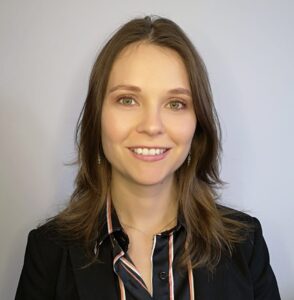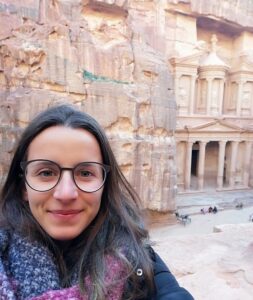Interview with Prof. Tamara Pawluk
An Expert Interview by Sara Micacchioni
Prof. Tamara Pawluk is specialized in cognitive diversity and inclusion. She has collaborated with teams designing Diversity and Inclusion campaigns and training teams to leverage diversity potential. Her professional goal is to contribute to any organization where diversity is seen as a key factor to achieve competitive advantages. Interestingly, she also works as Project Manager for Diego Romero Music to support her husband in bringing Argentinian and Latin American music into the European market.
In early September I met her in her apartment in Berlin to get inspired by what she does.
Who is Tamara Pawluk in a nutshell?
I am an interculturalist by profession and by mindset. I like working with people from different cultural

backgrounds, I am a curious person and I like to listen to stories. I have the feeling that everyone has a story to tell and that even when they think it’s not interesting, I always find it fascinating. I mean, we’re all protagonists of our lives after all.
I also love learning, not only from books and manuals but especially from people. I love to be amazed by what others do in their professions and act as a connecting bridge between them.
I’ve been teaching at college for six years. I love doing classes and helping people develop their talent and discovering their potential together. Currently I am mostly dedicated to webinars but I keep teaching within the startup I work for, Expertlead.
I am a very family-oriented person too and love spending time at home with my husband and my friends, playing cards or board games, watching Netflix…or going outside to practice roller skating (and failing miserably) 😉
Can you tell us a bit more about Expertlead and your projects there?
Our core business is trying to build a solid network of freelancers. However, we do this in a very human-centric way i.e. guiding them through a professional self-discovery journey and helping them plan their career development. We mostly work with IT professionals: front-end and back-end developers, mobile developers, software development engineers, architects, project managers, designers and data scientists. We try to understand what exactly each of them brings to the table and only then we do the matching. We don’t just feel responsible for ensuring that they get paid for their job, but we also worry that they are performing tasks that they really enjoy. Besides that, we also do webinars on professional branding, CV improvement, train the trainers, stakeholder management, and soft skills training.
As the head of freelancer management, I strive to help freelancers be the best versions of themselves.
One of the Diversity and Inclusion projects we’ve just launched is our blog series “Freelancing Women in Tech” about which I am really enthusiastic. We interview female freelancers within the network and discover together their success stories and obstacles they encounter in the IT field as women.
You can have a look at the blog and at our recent articles where we interview a female iOS developer and a female software engineer.
There is a lot of potential in IT when it comes to D&I and we’re trying to get in touch with other associations that might be connected to a wide and diverse talent pool. For example, we’d like to partner with associations for refugees that promote IT educational programs and other initiatives of this kind. If you are one of them, don’t hesitate to get in touch!
Would you like to share with our readers the learning and career path that brought you to the position you so passionately hold now?
Well, there are a couple of relevant episodes that really marked my professional development. The first was at the age of 15 when I got into an exchange program with people from around various parts of the world. Thanks to this, I got to spend lots of time with people from Tunisia, South Africa, Russia, you name it. Even if I was “just” a teenager, I was amazed by how much you can learn just by actually allowing yourself to be open to everything. That’s basically how I start to learn from people and about people. This marked me so much that it led me to choose my next degree, a BA in Intercultural Management.
What other salient events happened next?
Then I had the opportunity to work as a ghost in a haunted mansion at the famous Disney World Park in Orlando 😉 You might wonder what this has to do with what I do currently but…
There I had a conversation with a colleague of mine that really made me start reflecting about a reality I hadn’t been faced with much until then. And so I started getting curious about the topic of diversity and more in particular about gender and sexual orientation and the role that this plays in identity. This was such an eye-opener that I decided to make Diversity and Inclusion the focus of my PhD, creating a fusion with the topic of Intercultural Management.
Finally, the last piece of the puzzle fell into place when I met my husband who is a musician. I want to contextualize this: my parents are doctors and when I entered the field of Social Sciences they thought this was already weird. But what they accepted even less easily was me having a musician as my boyfriend. During this phase, I realised how important the role played by professional identity is in our lives. Now they love him as well as his music.
And so I landed in cognitive diversity, i.e. valuing people for the different ideas that they bring at the table and the different experiences they had in life. This brought me to Talent Management and to Berlin, where I currently live.
I can really say that being part of an amazing team at Expertlead really enables me to bring together all the different aspects of culture identity in which I am a specialist.
What are the major challenges that you face in your industry?
When it comes to Talent Management, unconscious bias for me is the main obstacle. Too often, I find that people very easily allow their own prejudices and pre-formed opinions to shape the situation they’re faced with as well as the idea of the person they have in front. The issue with unconscious bias is that in a few seconds, you’ve made up your mind and from that moment you don’t allow yourself to be wrong anymore.
But we need to change this and learn to admit that we can be wrong about the first impression. We need to learn to get rid of our assumptions, become better listeners and let the new information come in. This is especially important when you work with diversity.
This is interesting. How do you help people raise awareness about their own issues with unconscious bias?
When I encounter new clients, I always start with the most simple biases. I avoid talking about biases linked to gender, race, sexual orientation etc from the very beginning because they might make it difficult for people to let their barriers down.
I’d like you to run this small social experiment. Next time you’re in a group, just try to draw three boxes on a paper and ask three volunteers in front of you to write three words about diversity on the sheet. What happened?
I can bet that now all boxes contain a word. But have you actually ever asked them to write the words inside the boxes? If you followed my instructions carefully, you did not.
Yet, if you try to ask people to explain the reasons why they wrote words inside the boxes, you’ll see that they will struggle a lot finding the answers. And this is what a bias is about: thinking/doing something automatically and without second thoughts.
I tried this each semester for six years, and not in a single group was there a volunteer who did this differently.
That’s brilliant and quite an eye-opener.
Now, what education would you recommend to somebody who would like to embark on a career similar to yours?
Well, I’d start by saying that when you deal with jobs around Intercultural and Talent Management, I think it’s really important to find a good mentor. Follow someone in the field to whom you can relate professionally and let yourself be inspired by what they do. It’s not an easy-to-answer question because we, professionals in the intercultural field, very often have a different background.
Definitely, here in Europe there are a lot of academic courses you can decide from if you want to study this at university, and having studied in Argentina where options are really limited, I don’t know even half of them.
I am pretty confident when I say that the field of diversity allows for different career paths and allows you as well to find your own professional identity.
Certificates might open a gate or two but they won’t drive your internal need to make a change. It’s relatively easy to obtain certifications, but the most challenging and most important is finding the inner spark inside. Only this will make you thrive.
What’s your recipe for success?
Be yourself and be authentic to who you are. You’re never going to be happy trying to pretend to be someone you’re not. One of my mottos, and this is borrowed from a teacher, is
“Never stay where you don’t want to be.”
Considering that you probably spend half your existence at work. My tip is, if you have the privilege of deciding where you work, choose well where you want to spend your time.
Is there a final thought you’d like to share with our readers?
You might not be able to change the world, but if you manage to change only one person, you’ve changed a world.
If you want to be in touch with Prof. Tamara Pawluk you can connect on LinkedIn or write to her on Facebook. You can also subscribe to her Youtube channel.
Tamara is also busy writing her book on Diversity Management which she’ll publish in 2021. Stay tuned!
About Sara Micacchioni

Sara Micacchioni is currently working as Academic Intern at Global People Transitions, where she is responsible for research and quality assurance projects. At the beginning of 2020, she graduated from an international English-taught master degree in Intercultural Management at the University of Burgundy, France. In the past, she also carried out several short-term and long-term voluntary work projects in Europe and South America.
Sara lived, studied, and worked in seven European countries and speaks four foreign languages. She considers herself an interculturalist with a real passion for globetrotting. In her mission to travel the world, she has now ticked off 30 countries globally.
Connect with Sara on LinkedIn if you want to talk about Diversity and Inclusion, Intersectionality, Cultural Intelligence (CQ), Bilingualism, Digital Learning, Immigration or Low-Cost Travels.

